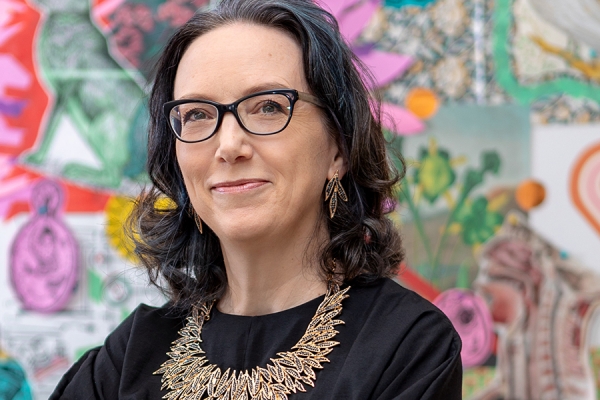 Art professor Jennifer Willet will head to Ottawa in May as part of a national delegation to meet with parliamentarians. Photo by Justin Elliott.
Art professor Jennifer Willet will head to Ottawa in May as part of a national delegation to meet with parliamentarians. Photo by Justin Elliott.
Jennifer Willet, director of the Incubator Art Lab and Canada Research Chair in Art, Science and Ecology, is one of 50 researchers from across Canada selected to travel to Ottawa in May to share their knowledge on science engagement with members of Parliament.
Science Meets Parliament, organized by the Canadian Science Policy Centre and sponsored by the Perimeter Institute and Stem Cell Network in partnership with Canada’s chief science advisor Mona Nemer, works towards advancing diverse science and innovation policies.
Dr. Willet is an artist, researcher, and curator working in the international field of bioart, a genre of contemporary art that includes living biological media, and often the tools and technologies of the biological sciences, in the production of art.
“As usual I have talked my way into a space that is not usually inhabited by artists,” says Willet. “I am curious and delighted to participate and share my knowledge about science engagement and represent UWindsor.”
The field of bioart has developed creative research methods that can help mitigate the challenges of public scientific discourse. Through radical interdisciplinarity, diversity and inclusion, community engagement, contemporary art, education, and whimsy, methodologies from the arts can contribute to reimagining science’s role in our society.
Willet has been building on post-pandemic interest in bioart to address challenges in science engagement made visible during the COVID-19 crisis, working collaboratively and across disciplines towards sustainable biotech futures.
“The Science Meets Parliament program is an opportunity to share with members of parliament what unique and effective tools and knowledges already exist at the intersection of art and science that could radically improve science literacy, communication, and engagement in the Canadian population,” says Willet, “an example of applied interdisciplinarity at its very best.”
Members of Parliament will learn about the process and results of research, the opportunities and challenges facing Canadian scientists, and advocacy for policy development directly from scientists. On the other hand, scientists from across Canada will explore what goals and concerns for science and technology development are present in Ottawa, and constraints facing members of Parliament.
Overall, this program is an important exercise in building better communication between academia and government, Willet says. She is excited to participate and hopes to encourage parliamentarians to extend this program to other fields in the arts, humanities, and social sciences.
